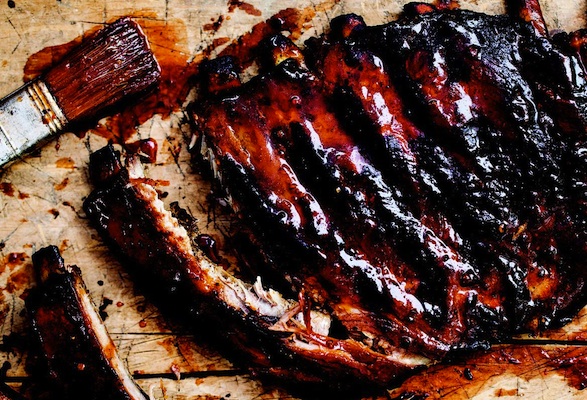
Photo by peden + monk
Feast your eyes upon a rack of ribs and more in this new comprehensive guide to grilling from Adam Rapaport.
Rapoport is the editor in chief of Bon Appétit magazine and the author of The Grilling Book: The Definitive Guide from Bon Appétit, which he will talk about and sign this Friday at Parson’s Chicken & Fish (2952 W. Armitage Ave., 773-384-3333). On Saturday, the magazine hosts two food and spirit tours called Grub Crawls. Dish readers can get 30 percent off the ticket price by clicking here for the Randolph Street afternoon event and here for the Logan Square evening event.
Dish: How long have you been at Bon Appétit?
Adam Rapoport: I want to say now two and a half years. Condé Nast decided to move Bon Appétit from L. A. to New York. I was brought on as new editor in chief.
D: Has the magazine’s content changed since the recession?
AR: It’s less about price than it is about how complex or difficult the recipe is. Time is more valuable for the home cook than price. [Home cooks] may not be buying foie gras and caviar, but the greater challenge is how much time do you have.
D: How do you hope readers use recipes?
AR: We stress lessons or techniques, trying to give tips and advice to make you a better cook. The more confident cook will use recipes as an inspiration. In The Grilling Book, there are lots of sidebars and lessons to be taught. Lots of advice, tips, and techniques. If you know how to hand-build a fire, how to manage the heat, [then] you can play with a marinade—if you know what the basic building blocks of a marinade are.
D: Okay, what are the basic building blocks of a marinade?
AR: First, let’s understand what we are using it for. If you have a great dry-aged, well-marbled rib eye or strip steak or porterhouse, do not marinate it. That would be disrespectful to the beef. [It’s for] if you’re making somebody’s secondary cuts—flank, skirt, London broil. Boneless chicken breast. Those always need some help. [In the marinade,] I always like to use some olive oil and—whether it’s red wine vinegar or lemon juice—some kind of acid to sharpen the flavor and tenderize meat. Something sweet, like honey. Soy sauce for salt. And flavoring agents: fresh ginger, garlic, chiles, or fresh herbs.
D: Why are you having the signing for your grilling book at Parson’s, a restaurant that specializes in frying?
AR: We just wanted a warm place, fun and not too fancy, not too stuffy. There will be passed food and cocktails. You want people who like to eat and drink—the two go hand in hand—and they understand a good cocktail there.


